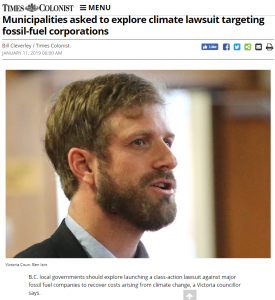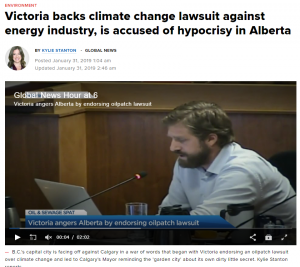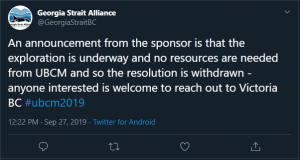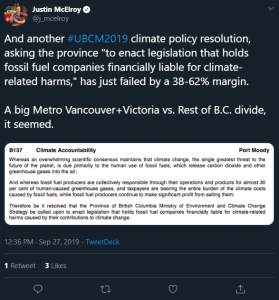The Union of British Columbia Municipalities (UBCM), which represents local governments across the province, held their annual convention this week, where the possibility of municipalities initiating a class-action lawsuit against energy companies was featured as a central issue and firmly rejected. Instead, officials endorsed Resolution B135, which stated that a climate lawsuit “is not an appropriate direction for B.C. communities.”
Ahead of the convention, Mayor Lori Ackerman of Fort Saint John, who sponsored the successful resolution, explained her position on lawsuits and climate change:
“These lawsuits are the embodiment of a divisive approach that pits energy companies against municipalities and hardens age-old divides: rural versus urban, province versus province, right versus left.”
Ackerman instead called for a consensus-oriented solution:
“Our communities and our energy companies all agree that we must mitigate and adapt to the impacts of climate change. This is why collaboration must be at the center of our climate change strategy, bridging the divide and achieving real progress on this critical issue.”
The first climate litigation resolution was sponsored by Victoria, which was once leading the charge to sue energy companies. When the Victoria city council originally passed this resolution, the city made headlines for being the first Canadian city to explicitly endorse climate lawsuits.



However support for the resolution eroded after Victoria Mayor Lisa Helps changed her mind on that approach and decided that the legal process would be too lengthy. At UBCM, Victoria Counselor Ben Islitt, the original sponsor, withdrew the resolution before it was voted on, prompting activists call on supporters to reach out to the city with questions on twitter:

A second resolution (B137) calling on British Columbia to enact legislation which “holds fossil fuel companies financially liable for climate-related harmed caused by their contributions to climate change” was voted on and only 38 percent of officials voted in favor:

Shortly before the convention it was reported that Provincial Environmental Minister George Heyman had already considered the idea and wrote, “at the present time the government is not considering either litigation or legislation.” The negative reception to pro-climate litigation legislation at the convention will likely strengthen Heyman’s position.
Despite the massive defeat of pro-climate litigation resolutions, almost all the other resolutions related to climate changed passed. This outcome was summarized by Justin McElroy of the CBC in a tweet:
The overwhelming rejection of climate litigation by the UBCM, despite a comprehensive multiyear campaign of lobbying officials across B.C. to support the lawsuits, indicates that the majority of communities in B.C. reject this divisive and misguided campaign.